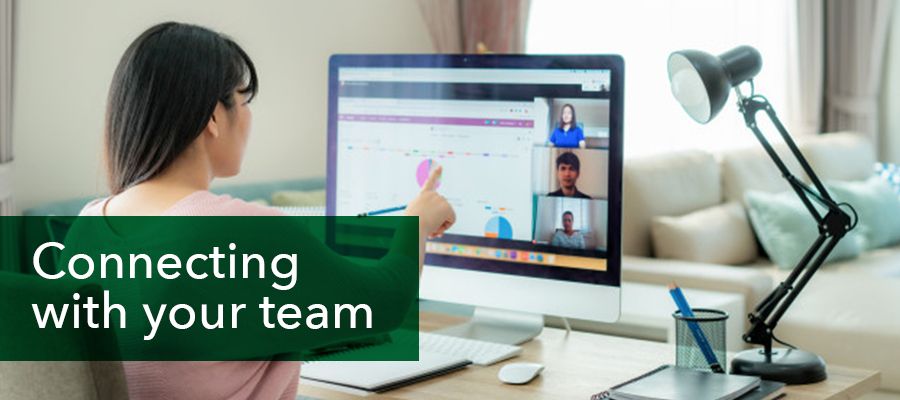7 tips for productive teleworking and e-learning
7 tips for productive teleworking and e-learning
7 tips for productive teleworking and e-learning
4/15/2020

If you feel like you’ve been involuntarily enrolled in a crash course in working from home since the pandemic struck, you’re not alone. It’s definitely not the kind of course we’re used to at UOG, but it’s nothing we can’t handle.
In a lot of ways, it’s easier – there’s no commute, the temperature on the AC is always just right, and you get a full pot of coffee all to yourself.
But as many of us have now discovered, it comes with challenges as well – incessant interruptions by kids, spouses, and pets, the frightening thought of being our own IT trouble-shooters, and missing out on water cooler or between-class conversations to talk about the thing weighing most on everyone’s mind – the “Tiger King.”
Working and learning from home can make it difficult to concentrate, communicate, and motivate. But as we make this transition, hopefully this handy list of tips will make it a little easier.

- Dedicate space in your home to work
. . . that isn’t your bed or recliner. Set aside a room, or partition off a section of a room, and clear it of clutter. Now what would make it more conducive to getting work done? A wireless mouse? A second monitor? A better chair? Noise-cancelling headphones? A trendy lamp? Take the time to source a few that will make this space workable, and even enjoyable, for potentially several months. Check with your supervisor or dean — you may be able to sign out equipment.
- Optimize your home Wi-Fi
If you missed the Office of Information Techology's (OIT) training session on this, check out the PowerPoint [here]. Some initial, no-cost steps to improve your home Wi-Fi are switching to a wired rather than a wireless connection, making sure your ethernet cable isn’t running alongside power cables, and moving your router closer to your workstation. You might also consider getting a new router all together or an additional wireless access point.

- Determine an official means of instant messaging
Now that we’re not able to pop our head over a screen or into each other’s offices, your team or office group needs some way to have those quick, candid conversations. WhatsApp is one way, but other platforms might work better when it comes to organizing custom conversation groups, searching for information, and integrating with other commonly used software, like OneDrive or Dropbox. The OIT team (helpdesk@triton.uog.edu) can help you find the best fit for your team.
- Establish expectations, and touch base daily
We may not fully understand the importance of working or learning on-site with one another until we aren’t. It may lead to more misunderstandings, unmet expectations, and miscommunications than usual. So right off the bat, it’s important to establish what you, or your team, are expected to do from home as well as when everyone is expected to be responsive. Then, keep each other posted daily with just a quick note to say what you’re working on or where your project stands.
- Hold regular team meetings
Sure, we’re keeping up with emails and using all the best GIFs to effectively express ourselves in our team chats, but nothing can take the place of an actual conversation. So be sure to hold regular meetings with your team, committee, or project group via video chat. And don’t be the black box in the room. Brush your hair, clear your dirty dishes, and click that “Join With Video” button! Seeing each other boosts morale and motivation. Plus, then everyone can meet Mr. Mittens and understand why your emails sometimes end in a long string of numbers and punctuation marks.

- Keep a routine
A big part of getting motivated and being productive is treating your online learning or work-from-home day like any other day. Get up at the same time, get dressed, and go to your workspace. Plan to put in your usual hours. Take breaks to step outside, video chat with a friend, play with the dog or with your kids, and take a lunch break like normal, but try to keep the dishes and laundry for after your school or workday.
- As much as possible, prevent distractions
This is probably the hardest part of learning and working from home. But those who have successfully worked from home for longer than we have offer these tips: Inform your household of your working hours and keep to a routine so others know what to expect. If it helps, post an “Available/Unavailable” sign or get a pair of noise cancelling headphones. If you have kids and pets, try to get them on a routine as well so they know when to expect alone time, meals, and playtime throughout the day. But most importantly, know that this is an unusual situation, and sometimes we just have to roll with the punches.

Joseph B. Gumataotao is the Acting Chief Human Resources Officer at the University of Guam. He holds a
juris doctorate from the Ave Maria School of Law and a bachelor’s in communications
from the University of Guam.


